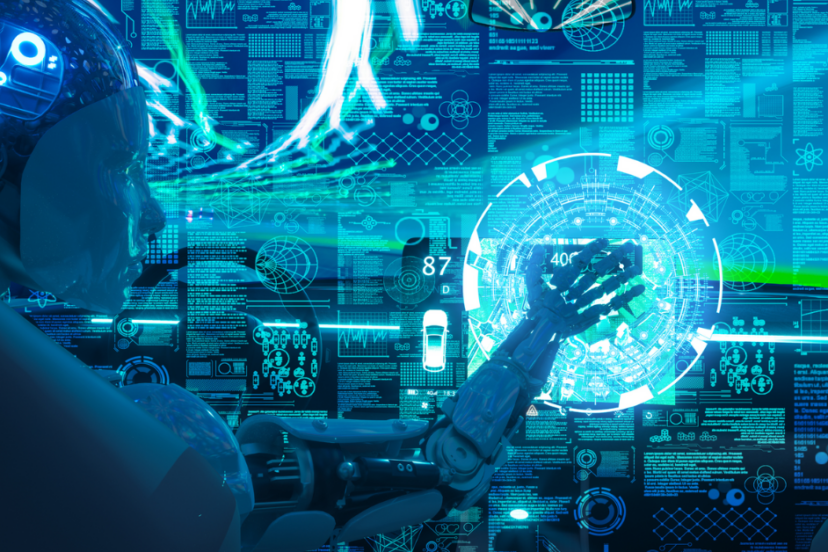Ethical and Responsible AI: Necessity in the Tech-Led World
While AI has been our dependable buddy, helping us with everything from calendar organization to recommending our next binge-worthy series, it’s essential to realize that it’s not all sunshine and roses. As this technology advances at a dizzying pace, it raises many ethical problems. Have you ever wondered how your data is used? Or how do these intangible entities make decisions regarding your life? It is now more important than ever to address these concerns and work toward a future with ethical and responsible AI.
We’ll delve into the ethical considerations of AI, the current debate over privacy, prejudice, and fairness, and the rising role of politicians and researchers in assuring the responsible deployment of AI systems.
So brace up as we embark on a fascinating investigation into ethical and responsible AI, which is becoming increasingly important in our tech-driven world. Stay tuned, and let’s unravel the subtle dance of AI, ethics, and responsibility together!
The Current State of AI: The Good, The Bad, and The Complex
This powerful technology has transformed our lives. Like other innovations, AI has many pros and cons, making its current condition difficult. Explore AI’s pros, cons, and complexity. Let’s dive in and explore AI’s good, bad, and intricate elements.
The Good: AI’s Potential and Achievements
AI’s transformational power is undeniable. AI systems can improve through machine learning and deep learning, enabling industry-wide innovation.
It also performs repetitive or data-intensive jobs faster and more accurately than humans. Moreover, it improves the user experience in Netflix’s movie recommendations, Amazon’s shopping suggestions, and Siri’s meeting scheduling.
Additionally, healthcare’s potential is noteworthy. It predicts illness outbreaks, personalizes patient treatment programs, and improves drug discovery. We’re approaching a world where AI can reliably detect health hazards before they become severe.
The Bad: The Concerns Surrounding AI
Despite AI’s impressive advances, it has obstacles. Concerns about AI range from ethical concerns to potential job losses owing to automation, data breaches, and the amplification of social biases.
Consider an AI system primarily trained on data from a specific demographic group. When adopted generally, such a system would unavoidably slant its outcomes in favor of that group, potentially leading to unfair or discriminatory decisions. These biases in AI systems raise serious ethical concerns.
Similarly, AI’s ability to collect and analyze vast volumes of data raises serious issues about privacy. With AI systems frequently acting as ‘black boxes’ with no transparency in their decision-making process, concerns about responsibility and trust arise.
The Complex: The Intricate Aspects of AI
Along with the good and the bad, there are challenging aspects of AI that include managing the fine line between innovation and regulation, ensuring that the advantages of AI are distributed rather than centralized, and addressing the potential for misuse of AI technologies.
AI is a fascinating blend of enormous potential and nuanced obstacles. It’s a fluid environment in which we continue to address the negative while navigating the complex. The goal as we progress is to steer this powerful technology in a way that optimizes its benefits while reducing its drawbacks, paving the path for a future in which AI serves humanity responsibly and ethically.
The Ethical Considerations of AI
As we delve deeper into AI, addressing the ethical issues that this revolutionary technology presents becomes imperative. From bias in algorithms to privacy concerns and fairness in AI systems, let’s dive into the ethical dimensions we must face head-on as a tech-driven society.
Bias in AI Systems
Imagine a scenario where an AI system, trained primarily on data from a specific demographic, skews its output towards that group, creating an inherent bias. It’s not a far-fetched situation. This scenario underscores how AI systems can unintentionally perpetuate and amplify existing social biases, leading to unfair outcomes.
Whether it’s a job recruitment tool that favors a specific gender or a facial recognition system that struggles to accurately recognize specific ethnic groups, biased AI systems can have real-life adverse impacts. This makes it a pressing ethical issue that needs addressing during AI design, development, and deployment.
AI and Privacy Concerns
Privacy concerns loom large in an age where data is the new oil. By their very nature, AI systems thrive on massive volumes of data, raising questions about what data is collected, how it’s used, who has access to it, and how it’s protected.
With AI often employed in sectors handling sensitive data like healthcare or finance, the potential for data misuse or breaches becomes a critical ethical concern. Moreover, the ubiquitous use of AI in everyday devices and applications makes it even more pressing to establish robust data privacy standards.
Fairness and Transparency in AI
AI systems making decisions that impact people’s lives have brought the concepts of fairness and transparency to the forefront. A fundamental ethical consideration is ensuring that AI systems treat all users equally without favoring one group.
Moreover, the complexity of AI systems, often described as ‘black box’ decision-making, makes it challenging for users to understand how a decision was made. Because a lack of transparency can lead to trust concerns, it is an ethical duty to guarantee that AI systems are transparent and their decision-making processes are explicable.
The Autonomy of AI
As AI systems become more sophisticated, there are growing concerns about AI autonomy and the potential for systems to make decisions without human intervention. This raises ethical questions about accountability, responsibility, and control.
Policymaking in AI: A Shift Towards Responsibility
The importance of effective policymaking around this advanced technology cannot be overstated in our tech-driven society, where AI revolutionizes various sectors. Policymaking is crucial in shaping a responsible AI landscape, balancing innovation with ethical considerations and societal impact. Let’s delve into the shift toward responsibility in AI policymaking.
Global Approaches to AI Regulations
As AI impacts lives globally, different regions have started implementing their own set of regulations. For example, the European Union has proposed the Artificial Intelligence Act to regulate high-risk AI systems while encouraging AI innovation.
However, a country-specific approach may create a fragmented regulatory landscape. Therefore, a global dialogue on harmonized AI regulations is critical to ensuring consistency, interoperability, and fair competition.
The Role of Policymakers in Mitigating AI Risks
Policymakers are entrusted with the task of mitigating potential risks associated with AI, including issues of bias, privacy, and security. They must establish data protection, transparency, and accountability standards in AI systems.
Policymaking also involves addressing the potential social consequences of AI, such as job displacement due to automation. Policies need to be in place for reskilling and upskilling the workforce to adapt to AI-driven changes in the job market.
Balancing Innovation and Regulation in AI
Finding a happy medium between encouraging and stifling innovation with regulations is tricky. Policymakers should encourage AI research and development, fostering a supportive environment for AI innovation while ensuring ethical and responsible AI practices.
Public-Private Partnerships in AI Policy
Collaborations between the public and private sectors can be very useful in developing AI policy. We can leverage their unique strengths by involving the government and private sector in policymaking. While governments can provide regulatory oversight, private companies bring innovative ideas and practical implementation insights.
The shift towards responsibility in AI policymaking reflects our collective effort to ensure that as AI technology advances, it does so ethically, responsibly, and for the benefit of all. It’s about shaping a future where AI creates technological breakthroughs and respects our societal norms, values, and rights.
Guidelines for Ethical and Responsible AI
Establishing ethical and responsible AI guidelines becomes necessary as we immerse ourselves deeper into the AI-driven era. These guidelines form a framework that allows us to harness the power of AI while ensuring that human values, rights, and freedoms are respected and protected. Let’s look at some critical guidelines for ethical and responsible AI.
Fairness
AI systems must be designed to treat all individuals and groups fairly. This involves preventing and mitigating biases arising from skewed training data, unrepresentative samples, or flawed algorithms. It also requires addressing systemic biases to ensure that AI does not perpetuate or amplify societal inequalities.
Transparency
The ‘black box’ problem—unclear how an AI system arrived at a decision—can lead to trust issues and potential misuse. Therefore, transparency is a key guideline. This involves making the decision-making process understandable and explainable to users and stakeholders. It could include measures like documenting the AI development process, creating interpretable models, and providing clear, understandable explanations for AI decisions.
Privacy and Data Protection
There are legitimate privacy and security issues since AI systems need access to massive amounts of data. To guarantee that data is acquired, kept, and utilized ethically. In line with any data privacy laws that may be in effect, guidelines for ethical AI must incorporate strong data governance principles.
Accountability
Regarding artificial intelligence, accountability means making it clear who is to blame for any mistakes made by the system. This includes providing mechanisms for auditing AI systems, establishing clear lines of responsibility, and ensuring processes are in place to address any adverse impacts or harms caused by AI systems.
Safety and Reliability
AI systems should be reliable and safe to use. This includes thoroughly testing AI systems before deployment. Monitoring them continuously during operation and planning to address potential failures or issues.
Human-Centric Design
AI systems should be designed with human values and needs at their core. This means ensuring that AI is user-friendly, respects human autonomy, and is designed to enhance, not replace, human capabilities.
Conclusion
AI continues to transform our world, bringing opportunities and challenges. Ethical and responsible AI is not a choice; it is a requirement. It is a collective obligation that requires a collaborative effort from all sectors of society. As a result, we all have a role to play in designing a community where AI serves us rather than vice versa.
We hope this blog piques your interest and inspires you to learn about AI ethics. It’s time to shift the discussion from “Can we build it?” to “Should we build it? It is time for an AI revolution in which ethics take precedence. And keep in mind that every conversation counts!
Do you have any ideas, experiences, or questions about ethical and responsible artificial intelligence? Please share them in the comments area below. We’d love to hear from you and continue this vital discussion. Here’s to a future in which AI is intelligent but also responsible and ethical!
FAQs
What is responsible AI? Responsible AI is the practice of designing, creating, and deploying AI systems that are transparent, fair, trustworthy, and respect human rights and dignity.
How can bias in AI systems be prevented? Preventing bias in AI systems involves using diverse datasets for training. Also, implementing robust testing processes and ensuring transparency in AI decision-making.
What role do researchers play in responsible AI? Researchers play a critical role in responsible AI by designing and developing systems with ethical considerations. Additionally, it contributes to policies and advocating for AI systems’ fairness, transparency, and privacy.
What is the ‘black box’ problem in AI? The ‘black box’ problem refers to the lack of transparency in AI systems. Users often need to understand how AI systems make decisions, which can lead to trust issues.
Why is AI ethics important? AI ethics ensures that AI systems respect human rights, are fair, unbiased, transparent, and do not cause harm. This ensures that the benefits of AI can be enjoyed by everyone equally.





Comments are closed.